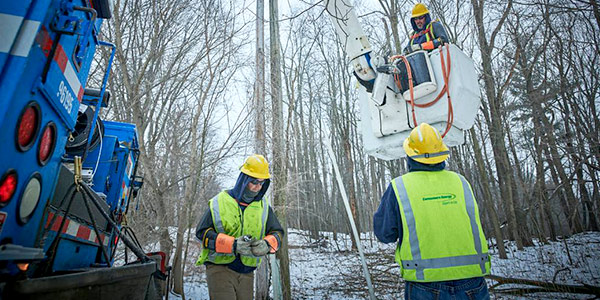By Amanda Durish Cook
Michigan regulators are calling on the state’s gas and electric utilities to step up measures to head off supply emergencies like the one that arose this past winter during a deep freeze.
While a draft report released by the Michigan Public Service Commission on July 1 determined that the state’s energy systems are adequate to meet customer needs, it also urged utilities to undertake a raft of improvements to address extreme weather events, security threats and the expanded use of renewable energy sources.
Gov. Gretchen Whitmer ordered the statewide energy assessment after a polar vortex struck the state Jan. 30-31. During the event, both Consumers Energy and DTE Energy issued public appeals for conservation, while Whitmer appeared on video via social media to ask ratepayers to lower thermostats or risk a gas shortage. Consumers’ gas scarcity was compounded by a fire at Ray Compressor Station near Detroit. (See “Gas Shortage Warnings,” MISO Maintains Reliability Through Arctic Midwest Temps.)
“Despite the positive outcome, the events of Jan. 30 and 31 raised significant concerns about whether Michigan’s energy systems can reliably produce and deliver energy to all Michiganders as extreme weather events increase,” the PSC said.
The agency was asked to evaluate whether the design of electric, natural gas and propane delivery systems are “adequate to account for operational problems, changing conditions and extreme weather events” (U-20464). The 231-page report makes 36 recommendations within the commission’s jurisdiction and 14 “observations” outside the scope of its jurisdiction.
Among its major recommendations, the PSC said utilities should:
- Incorporate five-year-ahead distribution and transmission plans into the integrated resource plans required by the state. The commission said the move would “ensure truly integrated electricity system planning” and could expand electrical connections between Michigan’s peninsulas and neighboring states. It said an expanded ability to import electricity could address short- and long-term reliability issues.
- Undertake “long-term, risk-based” natural gas infrastructure and maintenance planning. It also recommended natural gas utilities include equipment and facility outages in risk models and better plan for transmission contingencies.
- Make more careful retrofitting, retirement and new power plant build decisions. The agency said utilities should work with stakeholders “to understand the value of resource supply diversity” and not rely so heavily on traditional planning and financial analyses. Utilities should “propose a methodology to quantify the value of generation diversity in integrated resource plans.”
- Re-examine natural gas utility curtailment procedures to make sure they “prioritize home heating over electric generation.”
- Improve electric demand response programs “since some customers did not respond as expected during the polar vortex, and utility tariffs were inconsistent.” The PSC said natural gas utilities should also work to create DR programs “as an alternative to broad emergency appeals.” Utilities should also review their communication protocols with customers during DR events.
- Create rules for cybersecurity and incident reporting for natural gas utilities and improve energy system cybersecurity in general. The PSC suggested utilities undertake regular IT audits, simulated phishing campaigns, multifactor authentication for remote access and cybersecurity performance assessments.
- Develop standardized communications with the commission for electric and natural gas emergency events.
- Expand use of emergency drills “to provide a range of scenarios besides outage management and restoration.” The PSC said utilities should also test curtailment and DR events. “Communication related to the Ray event and the polar vortex was confusing, inconsistent and erratic,” it concluded.
- Improve communications and data sharing in general between electric utilities, PSC staff and RTOs to ensure that the “RTOs will have the information needed to plan and operate the electric system to accommodate an increasing amount of distributed energy resources.”
- “Overall, the energy system is strong but would benefit from increased resilience, strengthened infrastructure interconnections and improved communication,” PSC Chairman Sally Talberg said.
The PSC also found that MISO should enact a seasonal capacity auction, “more carefully consider” non-transmission alternatives prior to approving transmission projects and speed up its generator interconnection queue — although those items are outside of the regulator’s purview.
The commission also found that Michigan statue limits the PSC in assessing “meaningful penalties” for utilities that are not in compliance with the Michigan Gas Safety Standards. “This may impact the health, safety and welfare of Michigan residents,” the PSC said.
The commission formed five work groups — focusing on electricity, natural gas, propane, cyber and physical security, and energy emergency management — and hosted more than 40 internal and external meetings to create the initial report.
After a public comment period, the commission will deliver a final report to Gov. Whitmer by Sept. 13. The commission could then order utilities to take steps to improve their energy supply and delivery processes.
“Moving forward, this report will help to inform our next steps in assuring all Michiganders have reliable access to energy when they need it at home, at school and at work. With the transition to more renewable energy resources and the growing impact of climate change, it is imperative that our utility infrastructure can meet the changing demands while keeping rates affordable and protecting the environment,” Whitmer said in a press release.
In its latest resource adequacy survey, the Organization of MISO States identified Michigan’s Lower Peninsula as one of three MISO areas that could soon experience supply shortages, with a potential 0.9-GW shortage as early as 2020. (See Supply Future Brighter, OMS-MISO Survey Shows.)






